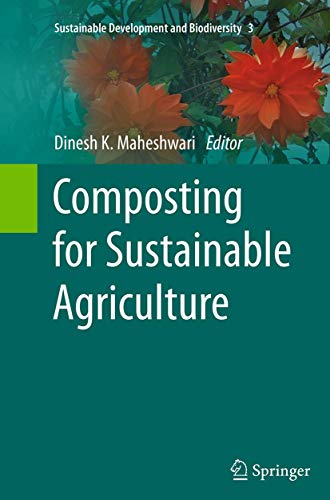Composting for Sustainable Agriculture: 3 (Sustainable Development and Biodiversity) - Softcover

Zu dieser ISBN ist aktuell kein Angebot verfügbar.
Alle Exemplare der Ausgabe mit dieser ISBN anzeigen:The dramatic worldwide increase in agricultural and industrial productivity has created severe environmental problems. Soil and groundwater reservoirs have been polluted with pesticides, xenobiotics and agro-chemicals. The global consensus to reduce inputs of chemical pesticides and agrochemical fertilizers, which are perceived at being hazardous by some consumers, has provided opportunities for the development of novel, benign sustainable crop management strategies.
The future of agricultural depends upon our ability to enhance the productivity without damage to their long-term production potential. One of the strategies is the application of effective microbial products beneficial for both farmers and ecosystems. This kind of approach can ensure both ecological and economic sustainability. Soil microbial populations are immersed in framework of interactions, which are known to affect plant fitness and soil quality.
For betterment of life of human being, improved quality and variety of products are formed due to versatile action of different group of microorganisms, Microbes are able to degrade solid waste material into compost which is a mixture of decayed organic matter, manure etc. Incomplete microbial degradation of organic waste where the microbial process varies aerobic to anaerobic form is stated as compost, if added to soil improves plant growth and development. The biological activities and microbial metabolism in the soil contribute to alter its mixture and fertility. Incorporation of organic remain in the form of compost is known to influence favourably the physio-chemical and biological properties of soil. The beneficial activities bestowed upon plants by compost utilization are multifaceted, hence most promising alternatives for achieving sustainable agricultural production.
An increased awareness on compost has led to their use in agricultural concern. Contents in the present book will comprised various chapters on the role of beneficial bacteria in the composting process. The application is depicted to achieve the attainable productivity besides, in disease management and suppressiveness of organisms of phytopathogenic in nature. Significance of the compost elicits certain responses e.g. soil reclamation, soil fertility, soil health and disease management exhibit due to quality compost amendment in soil. It serves as low cost prospective option for sustainable crop production and protection.
Excessive use of agrochemicals such as fertilizers and pesticides have some substantial benefits in enhancing crop productivity but may lead to environmental and ecological damages.
Compost, the organic by-products of farming and allied industries which derive from animals and other sources is considered as the source of immense practical value for raising crops. It aids agricultural sustainability by means of various processes such as green manuring, mulching etc.
Significance of compost for sustainable agriculture and the role of beneficial micro-organisms in composting processes is depicted in this volume entitled “Composting for Sustainable Agriculture”.
„Über diesen Titel“ kann sich auf eine andere Ausgabe dieses Titels beziehen.
- VerlagSpringer
- Erscheinungsdatum2016
- ISBN 10 3319381458
- ISBN 13 9783319381459
- EinbandTapa blanda
- Anzahl der Seiten300
- HerausgeberMaheshwari Dinesh K.
Neu kaufen
Mehr zu diesem Angebot erfahren
Versand:
EUR 32,99
Von Deutschland nach USA
Beste Suchergebnisse beim ZVAB
Composting for Sustainable Agriculture
Buchbeschreibung Taschenbuch. Zustand: Neu. Druck auf Anfrage Neuware - Printed after ordering - The dramatic worldwide increase in agricultural and industrial productivity has created severe environmental problems. Soil and groundwater reservoirs have been polluted with pesticides, xenobiotics and agro-chemicals. The global consensus to reduce inputs of chemical pesticides and agrochemical fertilizers, which are perceived at being hazardous by some consumers, has provided opportunities for the development of novel, benign sustainable crop management strategies.The future of agricultural depends upon our ability to enhance the productivity without damage to their long-term production potential. One of the strategies is the application of effective microbial products beneficial for both farmers and ecosystems. This kind of approach can ensure both ecological and economic sustainability. Soil microbial populations are immersed in framework of interactions, which are known to affect plant fitness and soil quality.For betterment of life of human being, improvedquality and variety of products are formed due to versatile action of different group of microorganisms, Microbes are able to degrade solid waste material into compost which is a mixture of decayed organic matter, manure etc. Incomplete microbial degradation of organic waste where the microbial process varies aerobic to anaerobic form is stated as compost, if added to soil improves plant growth and development. The biological activities and microbial metabolism in the soil contribute to alter its mixture and fertility. Incorporation of organic remain in the form of compost is known to influence favourably the physio-chemical and biological properties of soil. The beneficial activities bestowed upon plants by compost utilization are multifaceted, hence most promising alternatives for achieving sustainable agricultural production.An increased awareness on compost has led to their use in agricultural concern. Contents in the present book will comprised various chapters on the role of beneficial bacteria in the composting process. The application is depicted to achieve the attainable productivity besides, in disease management and suppressiveness of organisms of phytopathogenic in nature. Significance of the compost elicits certain responses e.g. soil reclamation, soil fertility, soil health and disease management exhibit due to quality compost amendment in soil. It serves as low cost prospective option for sustainable crop production and protection. Artikel-Nr. 9783319381459
Weitere Informationen zu diesem Verkäufer | Verkäufer kontaktieren

